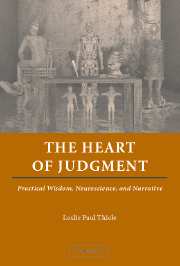1 - An Intellectual History of Judgment
Published online by Cambridge University Press: 20 July 2009
Summary
So vain and frivolous a thing is human prudence, and athwart all our plans, counsels, and precautions, Fortune still maintains her grasp on the results.
Michel de MontaigneA systematic theory of prudence would be a contradiction in terms.
Robert HarrimanJudgment is an understudied phenomenon in the history of moral and political thought. Unlike the concepts of reason, liberty, power, or justice, judgment has seen no treatises devoted to its explication, with the exception of a small number of works written in recent years. Only a few significant philosophers or theorists have shown an abiding concern with it. In this respect, a thorough history of the topic is made tractable, for there is relatively little ground to cover. Notwithstanding its feasibility, what follows is not a comprehensive account of the history of the concept. Rather, by way of a selective interpretation of key figures, this chapter charts the developmental milestones in the intellectual history of judgment. In turn, it suggests that judgment, while often rejected as an explicit focus of study, has proved itself to be a guiding thread of moral and political thought. Readers of later chapters will discover that the theoretical insights of thinkers who have grappled with the faculty of judgment over the last two and a half millennia – from Plato through the post-modernists – are frequently vindicated by contemporary empirical research.
Plato (c. 427–347 b.c.)
For Plato, the best part of the soul is rational or calculative.
- Type
- Chapter
- Information
- The Heart of JudgmentPractical Wisdom, Neuroscience, and Narrative, pp. 17 - 69Publisher: Cambridge University PressPrint publication year: 2006



